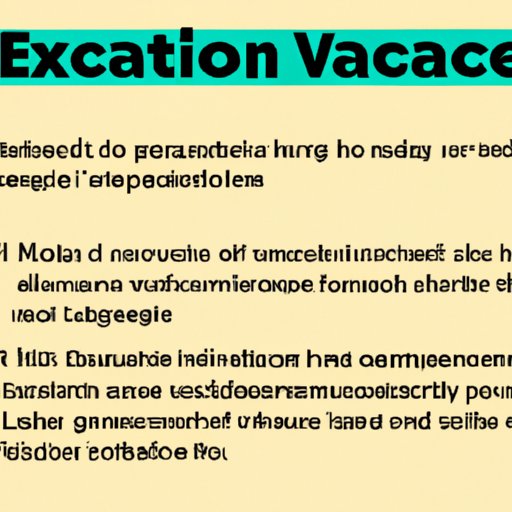Introduction
A notice to vacate is a document that either a landlord or tenant can provide to the other party to terminate a tenancy. Depending on the situation, the notice can be used to end a month-to-month tenancy, or it can be used to let the tenant know the lease will not be renewed at the end of its term. This article will discuss what a notice to vacate is, when it should be used, how to create one, and what rights tenants have when receiving a notice.

Understanding Notice to Vacate: What You Need to Know
It’s important to understand the definition of a notice to vacate and when it should be used. A notice to vacate is a document that is given to a tenant by a landlord or vice versa in order to terminate a tenancy agreement. It gives the tenant a certain amount of time—usually between 30 and 60 days—to move out of the property. The notice to vacate is required in most states.
A notice to vacate should be used when either the landlord or tenant wishes to terminate the rental agreement. If the tenant is breaking the rental agreement or not paying rent, the landlord can use the notice to vacate to start the eviction process. On the other hand, if the tenant wants to move out before the end of the lease term, they can give the landlord a notice to vacate to terminate the tenancy.

How to Create a Notice to Vacate
When creating a notice to vacate, there are certain requirements that must be met. Generally, the notice should include the date it was written, the date the tenant must vacate the property, and the signature of both parties. It should also include the address of the rental property, the reason for the termination of the tenancy, and any other information required by state law. Additionally, the notice should be served properly according to the laws of the state.
In order to write an effective notice to vacate, there are several steps you should follow. First, make sure to check your state’s laws to ensure you are following the proper procedures. Next, determine the date that the tenant must vacate the property. Then, fill out the notice to vacate form with all the necessary information. Finally, sign and serve the notice according to the laws of the state.
What Are the Legal Requirements for a Notice to Vacate?
The legal requirements for a notice to vacate vary from state to state. Federal and state laws dictate minimum notice periods for terminating a tenancy, which can range from three to sixty days. Additionally, local regulations may require additional notice periods. These laws should be followed when creating a notice to vacate.
In addition to minimum notice periods, some states require landlords to provide specific reasons for evicting a tenant. For example, in California, landlords must provide “just cause” for evicting a tenant. This means that the eviction must be related to a breach of the rental agreement or other legally accepted reasons, such as nonpayment of rent or damage to the property.
How to Respond to a Notice to Vacate
When a tenant receives a notice to vacate, they should take certain steps to protect their rights. First, they should read the notice carefully to ensure they understand the reasons for the eviction. Next, they should contact the landlord to discuss the situation and try to come to an agreement. Finally, if the tenant believes the notice is unjustified, they can contest the eviction in court.
If a tenant does not respond to the notice to vacate or cannot reach an agreement with the landlord, they may be evicted. In this case, the tenant should be aware of their rights under federal, state, and local laws. They may be entitled to relocation assistance or other forms of compensation depending on their circumstances.
What Rights Do Tenants Have When Receiving a Notice to Vacate?
Tenants have certain rights when they receive a notice to vacate. According to the National Low Income Housing Coalition, tenants have a right to notice. This means that landlords must give tenants reasonable notice before they can be evicted. The amount of notice required varies from state to state. Additionally, tenants may have a right to reasonable accommodations, such as extra time to find another place to live, if they are disabled.
“Evictions disproportionately impact people with disabilities,” says Roberta S. Morris, executive director of the National Low Income Housing Coalition. “Landlords should be aware of their obligation to provide reasonable accommodations to tenants with disabilities who are facing eviction.”

Common Mistakes to Avoid When Writing or Serving a Notice to Vacate
When writing or serving a notice to vacate, it’s important to avoid common mistakes. One mistake is not meeting the legal requirements for the notice. Landlords should make sure they are following the laws of their state and local jurisdiction when writing and serving the notice. Additionally, landlords should make sure to follow the proper service procedures for delivering the notice.
Finally, landlords should avoid retaliatory evictions. Retaliatory evictions occur when landlords evict a tenant in response to a complaint or request for repairs. Retaliatory evictions are illegal in many states, so landlords should make sure not to take action against a tenant in response to a complaint.
Conclusion
A notice to vacate is a document that either a landlord or tenant can provide to the other party to terminate a tenancy. It’s important to understand the definition of a notice to vacate and when it should be used. Additionally, landlords should make sure they are meeting the legal requirements for the notice and following the proper service procedures. Tenants should also be aware of their rights when receiving a notice to vacate. By understanding these concepts, landlords and tenants can ensure they are following the law when dealing with notices to vacate.
(Note: Is this article not meeting your expectations? Do you have knowledge or insights to share? Unlock new opportunities and expand your reach by joining our authors team. Click Registration to join us and share your expertise with our readers.)
